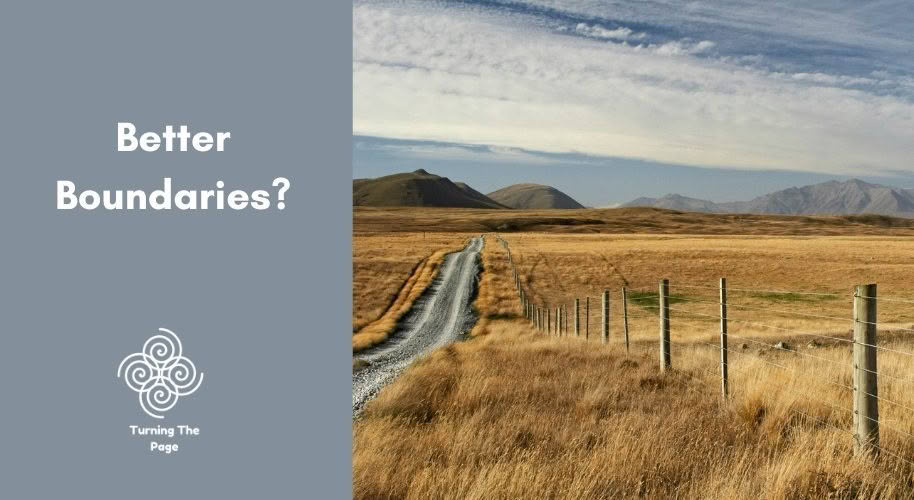‘You need better boundaries’. How many have said this to you? How about a better knowing of yourself first?
Often when you go to see a counsellor for the first time, they hand you a sheet of paper with a list of expectations and boundaries. Very few ask the counselee what their boundaries are.
I remember doing this with someone and they looked at me with some puzzlement. So I had to explain further.
I want to respect your privacy and basically how you run your life. What is the best way to communicate with you? What times of the day are best if I need to call you?
They had never been asked questions like this before.
They felt respected for who they were.
That they had value and rights in and of themselves. They had value as a human being separate from others.
Everyone of us is different from the other, but who are you?
What are your deepest values, or have you simply adopted them from others without ever internalising them and making them your own?
‘You need better boundaries’
I have always struggled with the concept of boundaries and I think those of my Myers-Briggs personality profile (INFJ) also find this.
I know that rules, laws, expectations, agreements – said and unsaid are important but I want to go deeper than external rule keeping.
I want to know why, because when I know the why and how it deeply relates to my relationship to myself, others, and especially God, then I can internalise it and make it my own.
Recently I had dinner with a couple of german tourists fresh off the plane. They wanted to know why we, here in New Zealand, had such strict border rules for people coming to New Zealand about bringing in fresh fruit, food, plants, etc.
I then explained that we don’t want foreign plants and diseases to enter our beautiful environment. It’s a heart thing.
As we looked across the harbour where I live, watching the setting sun and birdsong coming alive, they realised why we had a boundary and we enforced it strongly.
Here in New Zealand we have internalised our worth and beauty. We hold it in great respect and expect visitors who come to our doors to do the same.
What came first? The boundaries or the internalised value of what we have?
Three types of boundaries
I believe there are three types of boundaries, and they evolve from one to another as we mature.
1. Imposed boundaries
Boundaries that are imposed on us by others. The first boundaries we experience are those imposed upon us by parents. You don’t touch the hot stove; you don’t eat too much sugar; you eat your vegetables.
These imposed boundaries come from all sorts of places.
If you are in, say, a religious environment, then there will be imposed boundaries and rules. This is what we do here. To be part of this community, follow these rules. Some of these are good, some are questionable.
The government imposes rules and boundaries on your life. ‘You can only drive at 50 km/hr on these particular roads.’
They are imposed upon us. They come from the outside – in. Black and white.
But then we move on to a level of adoption.
2. Adopted boundaries
These are boundaries we adopt into ourselves. They don’t really feel part of us, but we accept them and try our best to live within their confines.
They become a habit. We might kick against them sometimes, push the limits, but they are adopted. Never fully integrated into us because they still feel like they are being imposed on us. They are still coming from the outside in.
The rules say don’t eat lots of sugar, but I like it and so I sneak a little
The rule wardens say ‘Dont watch pornography, and I agree it’s not healthy for me, but I still sneak in a little’
We have an adoption but not deeply internalised ownership
3. Internalised Owned boundaries
The final step in boundary evolution is one where we form within ourselves a deep heart felt ownership of who we are and what were about. This is who I am, this is what I believe and this is the outworking of it.
Like it or not, this is me.
You have deeply personalised and owned beliefs about certain things.
Biblical character Joshua stated it this way.
Now if you are unwilling to serve the Lord, choose this day whom you will serve, whether the gods your ancestors served in the region beyond the River or the gods of the Amorites in whose land you are living; but as for me and my household, we will serve the Lord.’ Joshua 24:15
Better boundaries come from the inside out
I want to take you on a little evolutionary journey of something in me and it has to do with the sabbath. A day of ceasing, stopping, resting, worship and play.
1. Imposed boundaries.
My first experience of sabbath keeping was that of was imposed upon me by my parents and the church I was part of.
We didn’t work on Sunday.
We rested, worshipped with friends and neighbours, and visited family.
It was imposed on me and back in the 1960s, most people, even non-church goers, lived within this culture. Shops were shut and most people chilled out for the day.
2. Adopted boundaries.
As I grew older and left home, I had to make a choice whether I would agree with this boundary.
I mostly adopted it, but with more and more shops being open on a Sunday and the world around me seemingly treating the day similar to others, then it got harder to keep the day to cease and rest.
3. Internalised Owned boundaries.
I now have a very heartfelt, inside out, belief about the importance for me to keep one day a week where I do no work.
I try not to even enter a shop if I have to.
I plan my week so that I don’t have to be involved in the world’s commerce for 24 hrs.
I even prepare meals ahead of time so I don’t have to cook.
I don’t do this to comply with some external rules laid down on me. I have come to realise that actually the sabbath is extremely good for me.
It helps my body; it teaches me to plan; it frees me to both worship and play. I have a holiday every 7 days.
I don’t keep it with religious rule bound rigour. I still respond to emergencies if needed, but now it comes with ease and not struggle.
When I know who I am, and what I value, and so I am strong.
Jesus knew himself
Looking at the life of Jesus, I think boundaries was one of the core issues people had with him.
There was a group of people that continually followed him around that acted like the boundary police. They were the judge, jury, and eventually became the executioner.
They were the ones who questioned his boundaries or seemingly lack of them.
I’m sure they would have said ‘You need better boundaries.’
They were concerned about Jesus eating with those who broke the rules.
While Jesus was having dinner at Matthew’s house, many tax collectors and sinners came and ate with him and his disciples.
When the Pharisees saw this, they asked his disciples, “Why does your teacher eat with tax collectors and sinners?” Matthew 9:10,11
In particular, they focused in on his observance of the Sabbath.
You see, Jesus knew who he was and what he was about. This deep knowing and integration stirred up the boundary police.
“I and the Father are one.”
Again, his Jewish opponents picked up stones to stone him, but Jesus said to them, “I have shown you many good works from the Father. For which of these do you stone me?”
“We are not stoning you for any good work,” they replied, “but for blasphemy, because you, a mere man, claim to be God.” John 10:30-33
“I’m telling you this straight. The Son can’t independently do a thing, only what he sees the Father doing. What the Father does, the Son does. The Father loves the Son and includes him in everything he is doing. John 5:19-20
You need a better knowing
You don’t need better boundaries; you need a better knowing of yourself and then the boundary lines will appear naturally to yourself. The lines where others won’t be allowed to cross. The lines you will protect with Christlike strength.
Lines describing you as you and not as them. There is an integration that is wholesome and strong.
They are lines that have been written on your heart.
I will give them one heart, and put a new spirit within them; I will remove the heart of stone from their flesh and give them a heart of flesh, so that they may follow my statutes and keep my ordinances and obey them. Then they shall be my people, and I will be their God. Ezekiel 11:19-20
But this is the covenant that I will make with the house of Israel after those days, says the Lord: I will put my law within them, and I will write it on their hearts; and I will be their God, and they shall be my people. Jeremiah 31:33
I will put my laws in their minds,
and write them on their hearts,
and I will be their God,
and they shall be my people. Hebrews 8:10
What is really important to you?
The question that requires a deep exploration of the heart is this:
What is deeply important to you?
For me, as someone with an allergy to egg, it is deeply important that I don’t eat eggs.
I live life around this. Others know it, respect it, and work around it.
I deeply hold the importance of having a full day of rest – sabbath.
I live life around this. Others know it, respect it, and work around it.
As I listen and explore another’s heart, I come to understand what is deeply important to them, and then help them understand and empower the lines that define them.
Better boundaries come from a knowing of who you are.
Questions?
Comments?
Email me 🙂📨
barry@turningthepage.co.nz
Give a little gift to keep the pages turning
Quotes to consider
- Care about what other people think you will always be their prisoner. Lao Tzu
- Human life must be about more than building boundaries, protecting identities, and teaching impulse control. Richard Rohr
- The role of heart and mind is to cooperate with truth by opening to love. We need the mind to know the truth of the heart, and we need the heart to know the truth of the mind. David G. Benner
- Real self-esteem comes from within; it is the existential, spiritual truth that we have value and worth intrinsically, because we are here and breathing, not because of anything we have or can do, nor how others regard us. Terrence Real
- There are no little people in God’s sight, so there are no little places. To be wholly committed to God in the place where God wants him [or her]—this is the creature glorified … This is the way of the Christian: he [or she] should choose the lesser place until God extrudes him [or her] into a position of more responsibility and authority. Francis Schaeffer No Little People
- Internalized or toxic shame lethally disgraces us to the point where we have no limits or boundaries. John Bradshaw.
Questions to answer
- ‘Yes, Jesus loves me, the Bible tells me so’ the childhood song trains the brain. How does one shift from ‘The Bible tells me so’ or the authority figure – parent, pastor, etc teaching me my beliefs, to a place where my heart and my life and experience tells me so?
- Have you been told ‘You need better boundaries’? What was you inital gut response to this being said to you?
- Better boundaries come from a knowing of who you are. Who are you are? What is deeply held by you as important and others would say is important to you?
Formation exercise
- Draw a line picture of yourself. Imagine yourself lying on a piece of paper and someone draws a line around you. In the inner part of the picture, write the words that describe your deepest values. Work really hard at going as deep as possible. ‘This is who I am separate from anyone else. Know this and you know me’.
Further reading
Barry Pearman
Photo by Geoff Bryant on Unsplash





